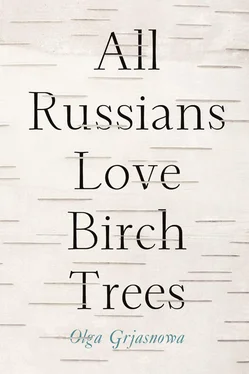I approached the armchairs and was about to sit down when he said, “That’s my side.”
He’s going to fire me, I thought. I sat down in the other chair.
“Masha, there hasn’t been that much to do lately. That’s partly because of the relatively calm political situation and partly because of severe budget cuts. And you’ve not been with us for very long.”
I took a deep breath.
“I’m going to tell you something about hierarchies. You know that I’m your boss and therefore you should generally do as I say. I don’t particularly feel like you have fully internalized that. You know, I have a boss, too, and my boss has a boss.” He looked me in the eyes, checking whether his words reverberated in my soul. Then he pointed with the index finger of his right hand toward the portrait of Angela Merkel. “I’m not particularly fond of that boss. Do you think I want to be ruled over by a woman from East Germany? Do I care about East Germany? Don’t make me laugh. But. I do as I’m told and I pay my taxes. Do you understand?”
I nodded.
“Next week our boss from Berlin is coming. As you know, our standing in Berlin is not exactly stellar. It’s our Arab offices that get the most funding these days. The foundations that are active in Israel get less and less. That’s just the general trend.”
I nodded.
“I’ll have to have several meetings with him. Present our work and our current projects to him. But he won’t be alone. He’s coming with company.”
“His wife?”
“Not necessarily.”
“Ah.”
“The lady who is accompanying him is in the region for the first time and I want you to take care of her.”
“Why me?”
“You’re the same age. You are going to accompany her to Jerusalem.”
“I don’t speak any Hebrew.”
“I’ve heard you speak. Why are you making such a big deal about it?”
“What does she want to do there in the first place?”
“Stroll through the market. Buy a few spices. What do I know? I’ll have to talk with him and she needs a babysitter.”
“I’m an interpreter.”
“Precisely. Why not haggle in Arabic at the market?”
The next day I picked up my assignment. She was already waiting in front of the hotel, in a very short leather skirt and dark designer shades. Long hair with blond highlights. She’d recently gotten a manicure. I considered myself lucky that she didn’t have a handbag dog. As a hello, she kissed my cheeks.
“I’m Maya. Thanks so much for coming along.”
“My pleasure.” I tried to smile just as fatuously as she did. “What would you like to see today?”
“I’d love to see the old town and then I want to see one of those settlements on the outskirts. I’ve read so much about them. So much injustice.”
We strolled down Yaffo Street. Maya kept stopping to look at window displays or take a picture.
“Bringing a camera along is like having a toddler with you,” she said coyly. Men on the street were constantly whistling at her. Even a few Orthodox Jews turned their heads, not as covertly as you might think.
Progress was slow through the old town. The narrow alleys were crammed with tourists, backpacks strapped to their chests, and believers from all across the denominational spectrum. Everyone in a fantasy uniform. The air was humid and stale. The merchants sat in front of their shops, yelling at the crowds: “Please, come in.” “Do you want to see my shop?” “Natasha, Natasha, idi syda .” Maya smiled at each and every one of them.
We were surrounded by clothes, postcards, incense, glass pearls, cheap jewelry, henna colors, and pyramids of spices. Keffiyehs hung next to IDF shirts, sold by Arab and Jewish merchants in equal measure.
One even ran after us. He’d overheard us speaking German and asked us to write down the word sale in German for him. He wanted to lure us into his shop, but it wasn’t necessary to lure Maya anywhere. I trudged behind the two.
In between keffiyehs and postcards, Maya told me and the merchants her life story. I abstained from translating. Born in Saarland. Her father was the mayor of her village (population: 200), her mother a home-maker. Home was crowded. Shortly after getting her trade school degree, she met an entrepreneur in a bar in Saarbrücken, much older than she. He took her along to Laos.
She tried on a dark blue scarf and the merchant held a mirror up to her. Lost in her own reflection, she continued: “I hardly remember my first husband. If I think about him at all, what comes to mind is the little black notebook with the blue lines that he always carried around with him. That’s what he used to keep track of his bowel movements. Meticulously.”
“Do you want to buy this scarf?” the merchant asked and I translated the question. She looked at me straight on, as if noticing my presence for the first time.
“I don’t have any money on me.” With her plastic nail, she tapped on the window. The shopkeeper understood the gesture and brought a different color. “In Laos I got used to the good things in life: spa treatments, massages, yoga, restaurants, delicacies, maids.”
We continued our way through the old town. A woman lugging a shopping bag jostled me. Again and again we passed by heavily armed police patrols. I had to buy freshly squeezed orange juice for Maya. She drank it slowly as she rambled on. I had tried rattling off touristy folklore, to direct Maya’s attention to an archaeological excavation or the Via Dolorosa, but she took every interruption of her monologue as an insult. When they returned to Germany, he immediately filed for divorce, without explanation. She got an apartment in Stuttgart and money, which she invested in diamond earrings, dresses, and a pearl necklace that had once belonged to a countess. And she got a tattoo. The sun had reached its highest point and I started heading toward the Austrian hospice. I could already imagine the taste of fresh lemonade on my tongue.
There, in the cool shade, she ordered the specialty of the house — apple strudel — and continued talking. She said the Jews were resting on the hard work of the Palestinians.
I remembered sitting in a waiting room with red leather chairs and an empty water cooler. My mother was with me. I was reading a magazine that was worn out from the many readers before me. All the crossword puzzles were already solved. In that magazine I’d spotted the article “The New Self-Confidence of the Jewish Community in Berlin.” My mother was embarrassed. She was partial to quiet, unobtrusive Jews.
“Seeing that stuff, all that injustice on the evening news, really makes you hate the Jews. It’s perfectly clear who the weak one is here, the victim,” Maya said. She wiped the sweat off her forehead. “Look at all the things they’ve done to the Palestinians. They of all people should know better.”
“German camps weren’t exactly moral reformatories,” I said.
She looked at me, suddenly a little insecure, laughed, and continued to gorge on the Austro-fascist strudel. One bite after the other disappeared into her mouth. Insatiable like a black hole. I called Sami and said that I would take the test, that I’d just quit my job.
I would let Tal know that I was sick of her games. That I’d had enough of her masturbatory wallowing in self-pity and that I was about to leave the city, and country, forever. Not brave enough to call her, I wrote an e-mail asking for a meeting in a small fish restaurant in Yaffo.
She didn’t come. I’d sat alone at the table, the waitress waiting impatiently with the menu. Finally, I ordered a redfish that I didn’t touch.
“Is something wrong with it?” the waitress asked, placing a carafe of water on the table.
Читать дальше












